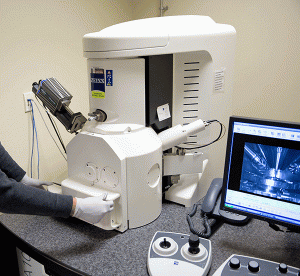Failure Analysis Testing
Medical Device Testing
Medical device innovations have greatly improved patient care and outcomes over the past few decades. As we push the envelope to treat new diseases, potential risks arise. As our ability to identify and mitigate these risks develops, we also must keep in mind the changing U.S. Food and Drug Administration, and global regulations. Even with elevated global regulations and a refined de-risking process, failures do occur in the clinic for several reasons. Identifying the root cause of these failures through validated scientific methods is an important part of the medical device design process. 
Testing Methods
When testing of a device component or process results in failure to meet its established acceptance criteria, the transition to failure analysis can be a daunting prospect. MED Institute has the experience, expertise, and tools to tackle the first steps of failure analysis – gathering data through non-destructive and destructive testing.
Visual Examination and Chemical Analysis
Our calibrated optical microscope can take high quality images and reliable measurements. Our experience imaging fatigue fractures, particles from particulate testing, debris from corrosion and fretting wear testing can provide you with the information required to diagnosis the failure and make necessary design changes.
If your analysis requires imaging of extremely small particles or surface defects, a scanning electron microscope (SEM) is one tool that can provide the necessary resolution. At MED, we utilize the latest SEM technology to provide the highest resolution imaging and materials contrast.
Failure analysis can benefit from methods that help confirm or identify materials. MED has multiple analytical capabilities that can assess whether materials meet specifications or to identify contaminants that may be associated with failure mechanisms.
Fourier transform infrared spectroscopy (FTIR) can be used to identify organic, polymeric, and some inorganic materials. FTIR microscopy (µFTIR), where a microscope is used in conjunction with FTIR spectroscopy, can be especially useful for analyzing smaller samples such as particles generated during particulate testing.
Where it may be difficult to unravel the morphologies of different polymeric particles in a medical device using optical methods, µFTIR is often able to sort out these variations whether in a single material or between multiple materials. The ability to identify materials can help connect the particulate debris generated from a device to a specific device component, thereby narrowing the investigation.
Another material identification tool readily available for chemical analysis is electron dispersive x-ray spectroscopy (EDS/EDX). EDS provides elemental analysis for a wide range of metallic, ceramic, and polymeric materials. When used in combination with the SEM, EDS can be employed to gather composition of features or regions of interest at very high magnification. The high spatial resolution of EDS makes it possible to determine compositional differences near failure locations, identify and delineate small particles, and interrogate surface contaminants and inclusions.
Our Testing Methods
Our lab is ISO/IEC 17025 accredited and has experience testing a wide range of medical devices. Specifically, our EDS test method is in accordance with ASTM E1508 and ASTM E766-14. We offer many different accredited medical device testing services, such as particulate, fatigue, and corrosion testing. If an unexpected failure occurs during your device testing, our experts can help you to streamline the failure analysis process and obtain the necessary data to understand why a device, component, or process failed.
Our medical device testing services
We have tools and experience to help with your testing and failure analysis needs. Please contact us today so that we can work together to make products and therapies that will improve patient outcomes. 855.463.1633 | medinstitute.com.
Get email about news, services, and events from MED Institute.
OUR COMMITMENT
We are committed to consistently performing services with high quality, that deliver exceptional results, and add value to the client’s business.
For client surveys sent since 2024, we received ratings of 4.99/5 (16).

